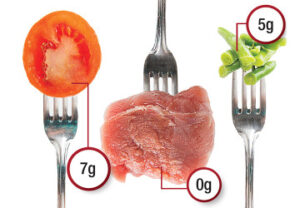Lower carb methods of eating have now been well published for years and the results are amazing when this approach is individualised. However it is extremely common for people trying this way of eating to become stuck and disappointed.
Here we have put together some of the most COMMON MISTAKES individuals make when going low-carb.
Keep reading our top 3 low carb mistakes to avoid.
1. Your focusing only on carb counting rather than the nutrient quality of the food!

Yep!!! Easy to do… and many personalities are ‘numbers driven’ but long term real change will come when the nutritional value of foods is better understood and the individual going low carb isn’t missing vital essential nutrients they need to thrive. Low carb information available on the internet can influence a drastic drop in carb intake but it doesn’t always offer education on adequate substitute protein intake, fibre intake or gut health. If confused you can turn to these resources here.
2. Going low carb will mean more meat, butter, cream, cheeses etc…are consumed

Absolutely NOT! going “Low carb” is not a free for all on these high energy dense foods – again an individual approach is recommended so its understood what your body needs in order to thrive and get the desired results you want.
When reducing carbs with really high fat and high calorie foods, one must be informed on portion and frequency of eating. To understand the next steps in a low carb journey seek support here.
3. Quitting too SOON

Assuming that before you go “low carb” you have fueled on carbs a long time, therefore the body is designed to preferentially burn carbs given this being your metabolic history to date. Therefore, in changing the way you fuel your body, things will take time to shift.
If you drastically cut back on carbs, your body needs to shift to burning fat which comes from either your diet or your body’s stores.
It can take a few days for your body to adapt to burning primarily fat instead of carbs, during which you will probably feel a little under the weather.
At this point it can be tempting to quit – but it may need to take several weeks for adaptation to take place.
Moral of the story is – seek accountability support to help you over the tough moments so you really can make that lifestyle change.



